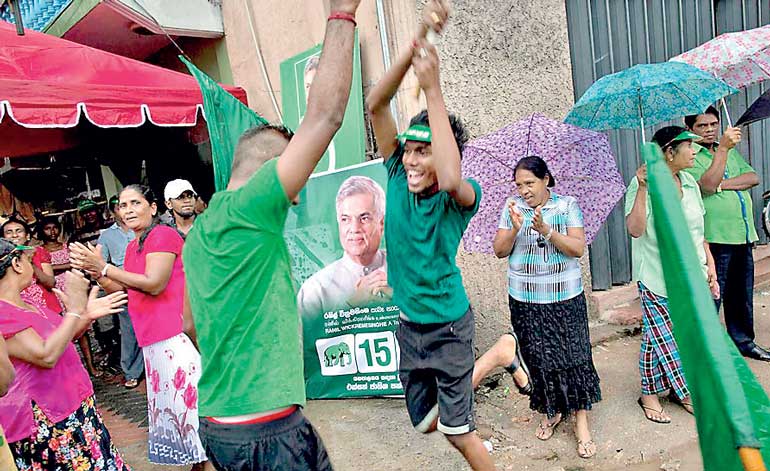Sunday Feb 22, 2026
Sunday Feb 22, 2026
Wednesday, 19 August 2015 01:30 - - {{hitsCtrl.values.hits}}

Supporters of Prime Minister Ranil Wickremesinghe, seen in a poster, celebrated as voting concluded during Parliamentary elections in Colombo17 August. Results announced Tuesday showed a surge in support for Wickremesinghe and his party – Gemunu Amarasinghe/Associated Press
Wall Street Journal: Sri Lankans backed the country’s new leaders in national elections, reconfirming support for a coalition that wants to revamp the political system, work on postwar reconciliation and strengthen ties with the West.
Results announced Tuesday showed a surge in support for Prime Minister Ranil Wickremesinghe and his United National Party, giving him and his allies enough seats in the 225-member Parliament to form the next government of the Indian Ocean island nation.
The UNP and its partners foiled a comeback bid by the country’s ex-president, Mahinda Rajapaksa—who was voted out of office in January amid accusations of that he had abused his power during his close to 10 years in office. Rajapaksa, who denies the allegations, was seeking to become prime minister.
“We should join together like the children of one mother to create a new political culture. We must face the challenges of a new era to uplift our country,” Wickremesinghe said in a statement Tuesday before final results were announced. “Let us build a government based on consensus. Let us create a country where all people have equal rights.”
The results solidify Sri Lanka’s pivot away from a political order dominated by Rajapaksa and his family. During his time in office, one of Rajapaksa’s brothers was the Economy Minister, another was secretary of defense and a third was speaker of Parliament.
Rajapaksa won widespread support by defeating ethnic Tamil separatists and ending a brutal civil war in 2009. But after the conflict, critics say Rajapaksa became increasingly authoritarian. Scorned by the West, he deepened the country’s ties with China.
Monday’s Parliamentary elections were seen as another nationwide referendum on Rajapaksa and his allies, who tried to block the reform agenda of the new government under President Maithripala Sirisena and Prime Minister Wickremesinghe after his ouster.
While Rajapaksa won his race to become a Member of Parliament, his party didn’t get enough seats to form a government.
“Sri Lankans have voted to sustain the change initiated with the presidential election in January,” said Jehan Perera, Executive Director for the nonprofit called National Peace Council “Voters chose accountability, good governance and also to live peacefully in an ethnically diverse country.”
After taking office in January, Sirisena’s Government launched a series of graft investigations. Rajapaksa relatives were among the first targets. Gotabaya Rajapaksa, the former Defence Secretary, is under investigation by anticorruption authorities. Prosecutors have charged Basil Rajapaksa with corruption-related offenses. Both deny wrongdoing.
With stronger support in Parliament, the new leaders are also expected to step up efforts to encourage reconciliation between the country’s Tamil minority community and its Sinhalese Buddhist majority.
Sri Lanka’s long civil war—in which the Government fought the Liberation Tamil Tigers of Eelam, a brutal insurgent force that used terrorist tactics like suicide bombings in an effort to win an independent Tamil state—left deep scars and distrust that the country is only starting to address.
In 2011, a United Nations expert panel said there was evidence of war crimes on both sides in the final months of the war. It said that up to 40,000 civilians, mostly Tamil, were killed in its final weeks. Many in the Tamil community say the Rajapaksa administration continued to marginalise and oppress them after the war ended.
Embracing the Tamil community and dealing with this legacy, analysts say, are critical to preventing a resurgence of ethnic violence.
Sirisena came to power in January promising to do more to promote reconciliation. It has released some Tamil political prisoners and returned some land the Sri Lankan military had taken from Tamils. It has also passed a witness-protection law and is looking for ways to replicate parts of South Africa’s Truth and Reconciliation Commission, as well as similar efforts in other countries such as Tunisia.
Sirisena has pledged to create domestic tribunals to work with the United Nations Human Rights Council, which is scheduled to unveil in September the findings of its own investigation into alleged human rights violations by the Government and the Tigers. Rajakpaksa and his backers have opposed cooperating with the UN.
Still, many Tamil leaders say Sirisena’s Government hasn’t gone far enough. They would like to see more prisoners released, more land returned as well as international supervision and participation in tracking and punishing human-rights violations.
Under Wickremesinghe, Sri Lanka will likely continue its efforts to rebalance the country’s foreign policy, looking to the US, Europe and India, its neighbour to the north, to offset the influence of China.
Beijing has bankrolled big infrastructure projects—including a port, airport and sports stadium in Rajapaksa’s hometown.
Last year, Chinese submarines—deployed by the country as part of its efforts to project power and expand its sphere of influence—were allowed to make two port calls in Colombo. This move worried both Washington and New Delhi.
The new Government has suspended work on a Chinese-backed real-estate development project to be built on a massive landfill off the coast of Colombo. They are also looking to refinance loans from China with money borrowed from others.
It is unlikely Sri Lanka will turn its back entirely on China. Colombo needs China’s money and its infrastructure-building experience. “Sri Lanka’s relations with China are too deep to be affected by any election,” said Rohan Samarajiva, economist and CEO of LIRNEasia, a policy think tank.